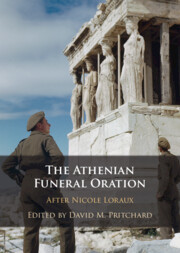Refine search
Actions for selected content:
7 results
Chapter 3 - Court and Country: Elites and the Military
-
- Book:
- The Pioneer Kingdoms of Macedon and Qin
- Published online:
- 24 May 2025
- Print publication:
- 05 June 2025, pp 123-156
-
- Chapter
- Export citation
18 - Sailors in the Funeral Oration and Beyond
- from Part V - The Language of Democracy
-
-
- Book:
- The Athenian Funeral Oration
- Published online:
- 11 January 2024
- Print publication:
- 01 February 2024, pp 376-413
-
- Chapter
- Export citation
1 - The Funeral Oration after Loraux
-
-
- Book:
- The Athenian Funeral Oration
- Published online:
- 11 January 2024
- Print publication:
- 01 February 2024, pp 1-56
-
- Chapter
- Export citation
2 - The ‘Beautiful Death’ from Homer to Democratic Athens
- from Part I - Contexts
-
-
- Book:
- The Athenian Funeral Oration
- Published online:
- 11 January 2024
- Print publication:
- 01 February 2024, pp 59-73
-
- Chapter
- Export citation

The Athenian Funeral Oration
- After Nicole Loraux
-
- Published online:
- 11 January 2024
- Print publication:
- 01 February 2024
3 - Reconstructing ancient warfare
- from Introduction: The Historiography of Ancient Warfare
-
-
- Book:
- The Cambridge History of Greek and Roman Warfare
- Published online:
- 28 March 2008
- Print publication:
- 06 December 2007, pp 54-82
-
- Chapter
- Export citation
1 - The modern historiography of ancient warfare
- from Introduction: The Historiography of Ancient Warfare
-
-
- Book:
- The Cambridge History of Greek and Roman Warfare
- Published online:
- 28 March 2008
- Print publication:
- 06 December 2007, pp 1-21
-
- Chapter
- Export citation
